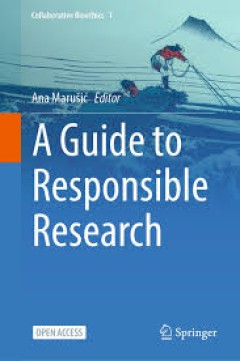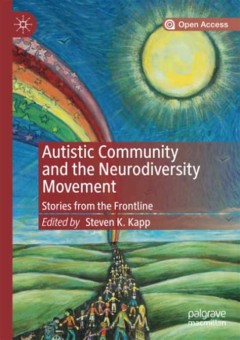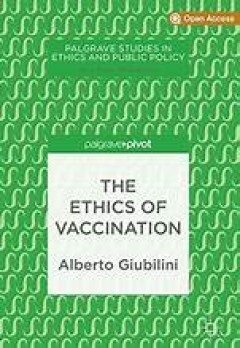Filter by

A Guide to Responsible Research
This Open Access book is a guide to good, responsible research at each step of the process of research discovery, so that a researcher at the beginning of a scientific career has a clear pathway to doing good research and producing reliable results. The textbook will give context to the practices described in the European Code of Conduct for Research Integrity, guided by the fundamental princi…
- Edition
- 1
- ISBN/ISSN
- 9783031224126
- Collation
- XIII, 135 hlm; ill., lamp.,
- Series Title
- 1
- Call Number
- -

A Theory of Bioethics
- Edition
- -
- ISBN/ISSN
- 9781009026710
- Collation
- oer.unej.ac.id
- Series Title
- -
- Call Number
- -
- Edition
- -
- ISBN/ISSN
- 9781009026710
- Collation
- oer.unej.ac.id
- Series Title
- -
- Call Number
- -

Charting Spiritual Care = The Emerging Role of Chaplaincy Records in Global H…
This open access volume is the first academic book on the controversial issue of including spiritual care in integrated electronic medical records (EMR). Based on an international study group comprising researchers from Europe (The Netherlands, Belgium and Switzerland), the United States, Canada, and Australia, this edited collection provides an overview of different charting practices and expe…
- Edition
- 1
- ISBN/ISSN
- 9783030470708
- Collation
- XV, 232 hlm; ill., lamp.,
- Series Title
- -
- Call Number
- -

Bioethics Across the Globe = Rebirthing Bioethics
This open access book addresses a variety of issues relating to bioethics, in order to initiate cross-cultural dialogue. Beginning with the history, it introduces various views on bioethics, based on specific experiences from Japan. It describes how Japan has been confronted with Western bioethics and the ethical issues new to this modern age, and how it has found its foothold as it decides whe…
- Edition
- 1
- ISBN/ISSN
- 9789811535727
- Collation
- XVIII, 146 hlm; ill., lamp.,
- Series Title
- -
- Call Number
- -

Rethinking Causality, Complexity and Evidence for the Unique Patient = A Caus…
This open access book is a unique resource for health professionals who are interested in understanding the philosophical foundations of their daily practice. It provides tools for untangling the motivations and rationality behind the way medicine and healthcare is studied, evaluated and practiced. In particular, it illustrates the impact that thinking about causation, complexity and evidence h…
- Edition
- 1
- ISBN/ISSN
- 9783030412395
- Collation
- XXII, 241 hlm; ill., lamp.,
- Series Title
- -
- Call Number
- -

Bioethics and the Holocaust = A Comprehensive Study in How the Holocaust Cont…
This open access book offers a framework for understanding how the Holocaust has shaped and continues to shape medical ethics, health policy, and questions related to human rights around the world. The field of bioethics continues to face questions of social and medical controversy that have their roots in the lessons of the Holocaust, such as debates over beginning-of-life and medical genetics…
- Edition
- 1
- ISBN/ISSN
- 9783031019876
- Collation
- XII, 323 hlm; ill., lamp.,
- Series Title
- 96
- Call Number
- -

Ethics and Drug Resistance: Collective Responsibility for Global Public Health
This Open Access volume provides in-depth analysis of the wide range of ethical issues associated with drug-resistant infectious diseases. Antimicrobial resistance (AMR) is widely recognized to be one of the greatest threats to global public health in coming decades; and it has thus become a major topic of discussion among leading bioethicists and scholars from related disciplines including eco…
- Edition
- -
- ISBN/ISSN
- 978-3-030-27874-8
- Collation
- XVII, 448
- Series Title
- Public Health Ethics Analysis
- Call Number
- -

Human Challenge Studies in Endemic Settings : Ethical and Regulatory Issues
This open access book provides an extensive review of ethical and regulatory issues related to human infection challenge studies, with a particular focus on the expansion of this type of research into endemic settings and/or low- and middle-income countries (LMICs). Human challenge studies (HCS) involve the intentional infection of research participants, and this type of research is rapidly inc…
- Edition
- -
- ISBN/ISSN
- 978-3-030-41480-1
- Collation
- XVII, 134
- Series Title
- SpringerBriefs in Ethics (BRIEFSETHIC)
- Call Number
- -

Autistic Community and the Neurodiversity Movement : Stories from the Frontline
This open access book marks the first historical overview of the autism rights branch of the neurodiversity movement, describing the activities and rationales of key leaders in their own words since it organized into a unique community in 1992. Sandwiched by editorial chapters that include critical analysis, the book contains 19 chapters by 21 authors about the forming of the autistic community…
- Edition
- 1
- ISBN/ISSN
- 9789811384370
- Collation
- XIX, 330 hlm,: ill, lamp;
- Series Title
- -
- Call Number
- -

The Ethics of Vaccination
This open access book discusses individual, collective, and institutional responsibilities with regard to vaccination from the perspective of philosophy and public health ethics. It addresses the issue of what it means for a collective to be morally responsible for the realisation of herd immunity and what the implications of collective responsibility are for individual and institutional respon…
- Edition
- 1
- ISBN/ISSN
- 978-3-030-02068-2
- Collation
- -
- Series Title
- Palgrave Studies in Ethics and Public Policy
- Call Number
- 2946-2746
 Computer Science, Information & General Works
Computer Science, Information & General Works  Philosophy & Psychology
Philosophy & Psychology  Religion
Religion  Social Sciences
Social Sciences  Language
Language  Pure Science
Pure Science  Applied Sciences
Applied Sciences  Art & Recreation
Art & Recreation  Literature
Literature  History & Geography
History & Geography